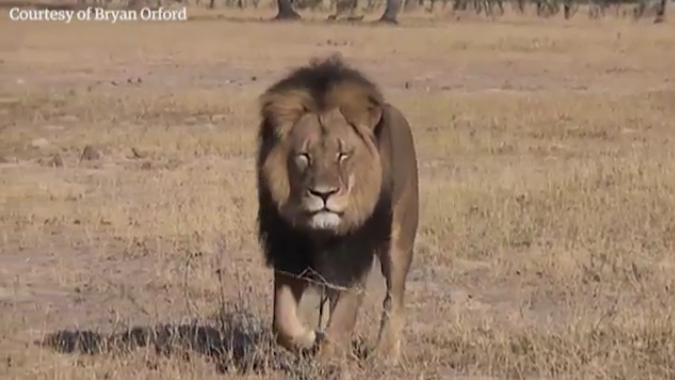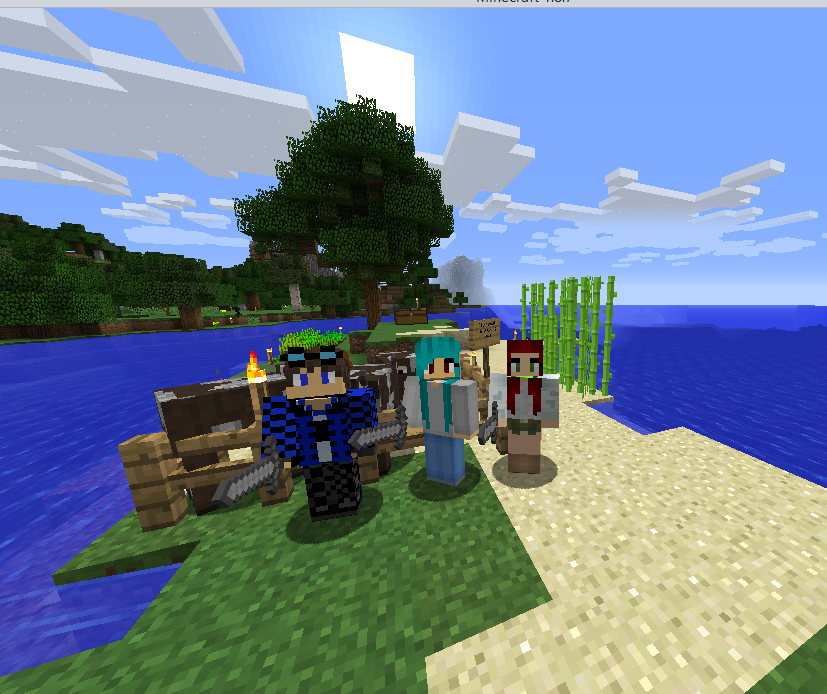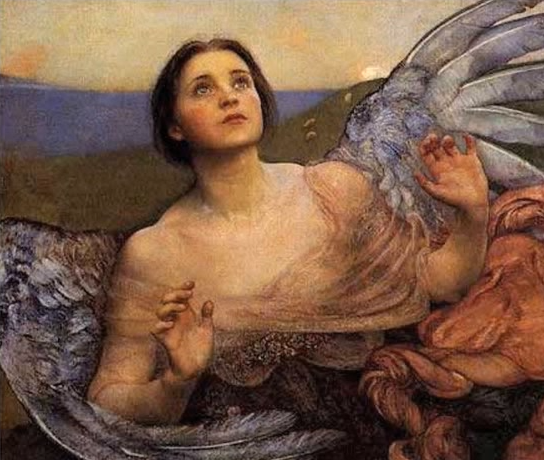Cecil

First question. Why would a person desire to kill a beautiful, majestic creature like this. Why would they spend £32,000 in order to be able to kill it. Why would skinning it and taking its head be important. How can we even begin to understand such behaviour from our own species. As so often in life, I want to try to turn David Attenborough (valuing all life and its behaviours) on the peculiar species to which I so often feel I only tenuously belong.
Some more precursor questions. Is it possible to morally judge one's own species objectively? It is even moral to assign an ethical hierarchy to human beings, from the standpoint of being one? What qualifies me to rank my fellow humans according to their values? Yet how else am I supposed to consider a person who thinks it is fun to kill a beautiful and rare creature except in terms of an ethical hierarchy which entails instinctive, yet surely primitive, ideas of good and evil? Where can I gain an objective vantage point in this squealing, infantile society where surely, surely this is a black and white ethical question (it is WRONG!) yet my own species is torn down the middle, ourselves animals for whom the question of to kill or not to kill is messy and full of the personal, the petty, and the political.
Instinctively I turn to rational empathy. I need to understand this. So, in the mind of this hunter, what justifies the death of the lion?
I'm not positioning myself as some kind of lone guardian of morality in the human race. This article points out that the majority of people can't understand the trophy hunting mentality. But I want to look at how the pro-hunting lobby justifies itself.
“It is a way of honoring that animal for all time.” Source.
Are we talking about religion? I need to look up whether there is a correlation between religious belief, and big game hunting. Does Christian faith entail the desire to kill one's fellow creatures? It wouldn't be the first such religious paradox. Perhaps for the religious, life can be truly valued once it is gone. Our life here is fundamentally meaningless; what has meaning is the Kingdom of Heaven in the afterlife. Therefore, killing an animal and venerating its corpse represents a greater meaning than allowing it to roam free, an empty and meaninglessly futile existence, on the African plain. Christians live in order to reap the reward at the end; not for the sake of living. So, life only holds meaning for the atheist. Extrapolation? In what way is this extrapolation? Show me how this is not true. Christians are living this life in order to earn their awaited glory after death. So causing an animal's death, here, is a way to access glory for the animal.
"Hunt operators are conservationists first, and hunters second." Source.
Shades of the recent fox hunting debates in England. Are big game hunters really helping local communities, providing employment and tourism income? The same article suggests that this is a fallacy, giving Kenya as an example, where the safari/tourism economy is thriving despite the total ban on trophy hunting.
I've saved until last the piece that requires the most thought. It's called "Why do people enjoy hunting so much?" and it's from GoodGameHunting.com. The whole thing deserves a read, but here are some key quotes.
"Being a hunter means that you have to adjust to the outdoors and what it has to offer. Just realizing that you are a small part of that vast drama that is Mother Nature fills your heart with joy and awe." Hunters see themselves as part of the food chain, perhaps. Of all justifications, maybe this is the most convincing. We are animals alongside other animals and that is our destiny whether we like it or not. This article also suggests the justification that on some level, big game hunters feel that humankind's mastery of the natural world is threatened by large and powerful creatures, so eliminating them is instinctive. These are the only justifications I feel I can understand, since they conceive of humans as creatures alongside the lion: but they do not allow the possibility for humans to use our intellect to rise above these concerns and to use our nuance of rationale and emotion to become better.
"When we travel, it is a new experience and we discover new wonders and views." Killing for sport is a way to broaden our experiences and create memories. Human experiences, but at the expense of other creatures' actual existence? I can't find any equilibrium here.
"Without this harvesting control, game animals can overpopulate, destroy their natural habitat or adversely impact other species in the environment." The word 'harvest' deeply disturbs me. The whole rationale about population control sounds so contrived I can't respect it.
And finally, "Life is about being happy, making others happy and enjoying the fruits of our labor.... We do what we do for the basic love of life and nature."
This is the one that stops me in my tracks. It calls upon the meaning of life to justify expending that of other creatures. Life is about enjoying killing. We kill animals because killing them is to experience them. Killing is to experience living.
And here I am, expending a lot of energy to try to understand someone else's point of view. Empathy and the moral hierarchy of animals and humans has been very clearly and concisely considered by others before me, of course, for many decades and with great philosophical integrity, and it rings with rational truth.
But I want to feed a more raw emotion into this deceptively simple rationale of empathy and life. If the hunter that killed this lion had even the slightest notion of empathy in this sense, he would have been able to picture, as I can, the life of this creature; his instinctive, base duty to his pride, his fellow creatures it was his role to protect; his simple routine of mornings and sunsets; the thrill of his hunts and the indolent hot pleasure of his daytime sleep; the warm breeze in his mane and the sharp taste of blood of his prey. I can picture the essence of physical life of a being not like me.
But let's go one step further and consider the fact that this is a famous lion, called Cecil. This one life matters to the world. There is worldwide outrage. But as Daria Zeoli points out, only caring about stunning African big game is speciesism. Worse still, only caring about a lion called Cecil is anthropomorphic speciesism. 'He' has a name, a family, an identity, a history set in relation with humans (several articles have pointed out how 'he' seemed to like interacting with humans). So we can not only care about him more than we care about a nameless chicken that was slaughtered yesterday down the road to end up on a shelf in the Co-op, but also more than about the 600 lions that are hunted to death each year, because he has a name and human-like identity. Maybe I have an emotional reaction to imagining Cecil's life because I have a hopelessly childlike empathy for anthropomorphised animals having read too much Redwall. It's not enough. It's the same ethical problem built into our nature that makes us care more about one or a few deaths in our own town or country than about many deaths a long way away in a distant country. But again, it behoves us to better ourselves, whatever the instinctive reaction of our primitive emotions may be, to actively decide to be better and to think harder and care more truthfully and behave more responsibly.
So far, so good. But picturing the life, love and desire of a fellow human being whose idea of pleasure is to saw off a great golden head from its body, for a 'trophy'; to take pleasure in the striking down of rare and stunning animals, in order to live more richly through the experience of causing their deaths; this I can not empathise with. I will never understand it. Even if it may be paradoxical to claim the inability to empathise with a person who has no empathy, I can't get away from the fact that from an emotional point of view, however I try to consider it, I can not posit this person's frame of mind. Yet this is a person from my own species, with a name, family, job, everything I should be able to understand. An intelligent person, a dentist, from a Western context I should be able to completely understand and picture. I'm left shaking my head and floundering to explain it. That man's absence of consideration for the lion as a being has to be psychopathic, because a psychopath can not understand that his or her fellow beings have feelings of their own. It is cruel. It is insane. It is perverted. I can't belong to his species. Who knows what my species is; but it is not the same as his. Here I draw my line.
Attempting to better myself as a human being I am inevitably going to leave behind those who actively do not try, or those who actively claim that their way of being human is to embrace primitive ethics, to kill in order to be truly human; whereas I wish to not kill in order to be truly human, because being truly human means to better myself.





Member discussion